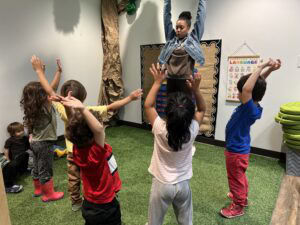
Introduction: Toddlers Are Always Learning
Toddlers are constantly absorbing the world around them. Every moment, no matter how mundane it seems, is an opportunity to learn. Whether they are stacking blocks, imitating your every action, or asking questions about each thing they see, toddlers are building their understanding of the world. As parents, we play a crucial role in reinforcing the lessons toddlers are learning, by providing them with both guidance and freedom to explore. Child care settings and early education environments lay a solid foundation, but your involvement at home is what solidifies those early lessons and helps your child truly thrive. Every small interaction and intentional moment spent together can significantly impact their development. This guide breaks down essential developmental concepts based on All About Child Care and Early Education and offers actionable ways for you to reinforce these concepts at home, giving your toddler the best chance to succeed in all areas of life.
- Building Emotional Security
Emotional security is key to everything toddlers need to grow. A toddler who feels emotionally secure is more likely to explore, take risks, and develop social and cognitive skills. Emotional security grows from knowing what to expect, feeling heard, and knowing you’re safe (Gonzalez-Mena 101). Toddlers are experts at picking up on how you’re feeling, and the way you respond helps them understand their own emotions. When you respond with patience, you’re showing them how to handle their emotions and building trust. When toddlers feel secure, they gain the confidence to explore and engage with the world around them, knowing they have a safe base to return to.
How to Reinforce It:
- Consistent routines: Toddlers thrive in environments where routines are consistent. Predictable patterns in daily life help them feel safe and secure. For example, having a set routine for bedtime—bath time, followed by story time, then lights out—provides a sense of structure. A routine like this shows your toddler that the world is predictable, helping them feel safe and confident (Gonzalez-Mena 102).
- Responsive caregiving: Toddlers rely heavily on caregivers to respond to their emotional needs. If your child is upset, try to acknowledge their feelings. For instance, if they’re frustrated after a toy breaks, rather than simply offering a solution, acknowledge the frustration by saying, “I can see you’re upset because your toy broke. Let’s see if we can fix it together.” By validating their emotions, you teach your toddler to identify and manage their feelings (Gonzalez-Mena 104).
- Letting your toddler express how they feel is crucial. You might think it’s easier to just do things for them, but giving them the chance to voice their emotions helps them develop emotional regulation. When they’re upset, provide comfort without immediately trying to fix the situation. Sometimes, just sitting with them for a moment can provide them the emotional security they need to calm down.
By establishing a stable, loving environment and showing empathy for your toddler’s feelings, you help build the emotional security they need to succeed in every area of development.

2. Supporting Social Skills
Social skills don’t just develop on their own. Toddlers are beginning to understand that the world doesn’t revolve around them, and they’re learning how to share, interact with others, and even manage conflict (Gonzalez-Mena 128). Social skills are fundamental for future success in relationships, both with peers and adults. Early socialization also teaches toddlers about empathy, taking turns, and understanding others’ emotions.
How to Reinforce It:
- Model social behaviors: Toddlers are like sponges, soaking up everything they see. By modeling respectful and empathetic behavior, you’re teaching them how to interact with others. If they see you saying “thank you” to the cashier or helping a friend, they’ll be more likely to mimic these behaviors in their own interactions (Gonzalez-Mena 130).
- Positive reinforcement: When your toddler shares a toy or expresses their feelings verbally, make sure to acknowledge it. A simple “Good job sharing with your friend!” or “That was a kind way to ask for help” reinforces positive social behavior. Over time, they will internalize these behaviors, knowing that kindness and cooperation are valued (Gonzalez-Mena 132).
- Create opportunities for interaction: While social skills develop over time, they’re best learned through experience. Set up playdates or trips to the park where your toddler can interact with peers. During these interactions, you can gently guide them in learning to share, take turns, and understand the perspective of others. Role-playing games also help toddlers practice new social situations (Gonzalez-Mena 132).
As your toddler learns to navigate relationships, they will develop empathy, communication skills, and a sense of belonging. Helping them practice these skills now ensures that they’ll be prepared for more complex social situations in the future.
3. Language Development: It Starts With You
Language development is one of the most exciting milestones of toddlerhood. During this stage, toddlers rapidly expand their vocabulary and begin to string together words into simple sentences (Gonzalez-Mena 157). Parents and caregivers play a crucial role in this process by modeling language, engaging in conversations, and reading together. Toddlers are listening to every word you say, and every interaction is an opportunity for language growth.
How to Reinforce It:
- Talk constantly: Describe what you’re doing throughout the day to give your toddler a rich language experience. For example, when making lunch, you could say, “I’m chopping the carrots, and they’re so crunchy.” Even when they’re too young to respond, they’re absorbing new words and sounds (Gonzalez-Mena 160).
- Read together: Reading is an essential activity for language development. Choose books with colorful pictures, rhyme schemes, and simple text. Repeat stories, as toddlers love the predictability of familiar books. This repetition helps build their vocabulary and understanding of language (Gonzalez-Mena 160). Encourage them to point to pictures, repeat words, or act out parts of the story.
- Ask open-ended questions: As your toddler’s language skills develop, encourage them to talk more. Instead of asking “What color is this?” ask “What do you think will happen if we mix these colors together?” This helps stimulate their thinking and encourages them to use more words (Gonzalez-Mena 161).
The more opportunities you create for your toddler to engage in conversation, the more their language skills will flourish. From basic words to full sentences, your involvement will have a lasting impact on their ability to communicate effectively.
4. Motor Skills: Big Moves & Tiny Fingers
Toddlers are in a constant state of physical growth and development. Their motor skills—both gross and fine—play a pivotal role in their ability to explore their world and gain independence (Gonzalez-Mena 176). Gross motor skills like walking, running, and climbing allow toddlers to interact physically with their environment, while fine motor skills like drawing, stacking, and manipulating objects help them develop coordination and precision.
How to Reinforce It:
- Encourage outdoor play: Active play is essential for developing gross motor skills. Whether it’s running around at the park, kicking a ball, or climbing on jungle gyms, these activities help toddlers build strength, coordination, and confidence (Gonzalez-Mena 179). Regular outdoor play also promotes healthy physical development and provides the sensory stimulation toddlers need.
- Support fine motor development: Provide your toddler with activities that strengthen their fine motor skills, such as drawing, stacking blocks, or playing with playdough. These activities require them to use their hands in increasingly complex ways, and the more they practice, the more dexterous they become (Gonzalez-Mena 182). Offer a variety of materials—crayons, markers, scissors, and puzzles—to encourage exploration.
- Let them help with household tasks: Simple activities like folding laundry, setting the table, or picking up toys not only help toddlers feel like active participants but also promote motor skills development. Give them safe, manageable tasks to do alongside you. Even something as simple as stirring the soup or wiping down the table helps toddlers develop strength and coordination.
Encouraging movement and providing opportunities for both gross and fine motor practice sets your toddler up for a lifetime of physical and cognitive growth. As they gain confidence in their abilities, their world will expand in ways you may not have anticipated.

5. Cognitive Growth: Tiny Scientists at Work
Toddlers are like little scientists, constantly exploring their world through trial and error. Cognitive growth at this age is focused on memory, problem-solving, and learning cause-and-effect relationships (Gonzalez-Mena 195). Every time your toddler pushes a toy car down the stairs and watches it roll, they’re learning something new about how the world works.
How to Reinforce It:
- Provide exploratory play opportunities: Toys and activities that encourage problem-solving are invaluable. Blocks, puzzles, and sorting toys are all excellent ways to help your toddler develop their cognitive abilities (Gonzalez-Mena 198). For instance, a set of colorful cups can help them learn about size and shape while encouraging sorting and stacking.
- Ask thought-provoking questions: Rather than providing all the answers, ask questions that encourage your toddler to think. For example, “What do you think will happen if we put this block on top of the tower?” or “How do you think this puzzle fits together?” Asking questions like these helps toddlers develop critical thinking skills (Gonzalez-Mena 200).
- Explore cause and effect: Let them experiment with objects that demonstrate cause and effect. Water play, simple machines, or toys with buttons and levers all help toddlers understand how their actions produce outcomes. For example, pressing a button to make a toy light up or produce sound helps them make connections between their actions and the results.
Encouraging exploration, providing open-ended play, and asking questions that spark curiosity are all great ways to stimulate your toddler’s cognitive growth.
6. Self-Help Skills & Independence
As toddlers develop, they become more independent and begin to understand the concept of self-help skills. These are the foundational skills that allow them to take care of themselves and become more self-sufficient (Gonzalez-Mena 215). Encouraging your toddler to do things for themselves, even in small ways, not only boosts their confidence but also helps them develop a sense of responsibility and autonomy.
How to Reinforce It:
- Let them do things on their own: If your toddler wants to put on their own shoes or feed themselves, give them the chance—even if it takes longer. The more opportunities they have to practice self-help skills, the more capable they’ll become. Sometimes the process is messy, but the reward is a toddler who is developing independence (Gonzalez-Mena 217).
- Give choices: Toddlers love to have control over their environment. Giving them choices helps them feel empowered. For example, let them choose between two snacks or pick out their clothes for the day. Offering controlled choices also helps toddlers learn decision-making and fosters a sense of autonomy (Gonzalez-Mena 220).
- Praise their efforts: When your toddler takes on a new responsibility or tries something independently, praise their effort. Even if they don’t get it perfect, acknowledge their bravery and persistence. This positive reinforcement encourages them to keep trying (Gonzalez-Mena 222).
Allowing toddlers to take on small responsibilities and make decisions on their own builds their independence, which is key to their development as self-reliant individuals.
A Constant Journey
Parenting a toddler is an exciting, challenging, and incredibly rewarding experience. By reinforcing the foundational concepts of emotional security, social skills, language development, and more, you’re giving your toddler the tools they need to navigate the world with confidence and joy. The early years are crucial for building these essential skills—the work you put in now will have lasting effects for years to come. You won’t always have perfect days, and that’s okay. What matters most is consistency, love, and showing up even when things get messy. Remember, being involved in your toddler’s growth doesn’t mean you need to be perfect; it just means being present, staying patient, and guiding them with heart. With your support, your toddler will continue to thrive in every stage of their development.
Sources
Gonzalez-Mena, Janet, and Dianne Widmeyer Eyer. All About Child Care and Early Education: A Comprehensive Resource for Child Care Professionals. Pearson, 2016.

